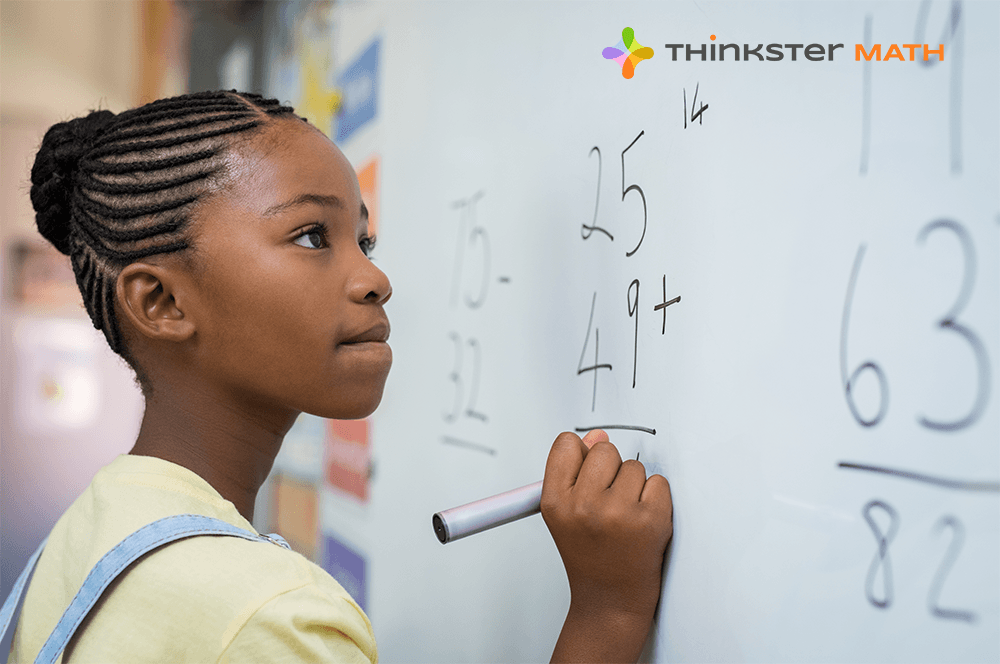Do you remember memorizing multiplication and division tables in school? If you memorized things like how to spell certain words and the capitals of the 50 states, you’re not alone. While memorization has its place in learning, current education standards have changed to move students beyond basic rote learning and into meaningful learning practices and critical thinking, which are more beneficial in the long run.
So, what does this mean for your student? If you’re worried about your child falling behind, or are having trouble mastering critical thinking skills, working with an online math tutor might be necessary. The right tutor can help take your student beyond rote learning, so they’ll better understand how to succeed throughout school and beyond. What’s the Difference Between Rote Learning and Meaningful Learning?
What’s the Difference Between Rote Learning and Meaningful Learning?
Rote learning is essentially memorization that is based on repetition. The thought behind it is that the more one repeats information, the quicker that person will be able to recall the information when needed.
Meaningful learning (or deep learning), on the other hand, focuses more on engaging with the subject matter, thinking critically, and understanding how all the pieces work together. In its essence, it encourages understanding rather than memorization.
Leaning heavily on memorization often obstructs deeper learning; much of the information students learn this way is later lost. With deeper learning, students “transfer” knowledge rather than just memorizing it — that is, they can take a piece of information and use it effectively in different contexts and problems. This type of learning encourages questions and ideas and also leads to recognizing patterns. When students see these patterns — and truly understand the information at hand — their brain is more likely to retain it.
But why is this so? According to cognitive scientists, each time the brain is given new information, it has to make a decision: is this information relevant and worth remembering? If so, it will make the effort to store the information in its long-term memory. If not, the likelihood of being able to efficiently “transfer” the knowledge is much lower.
Unfortunately, in most schools, the lessons end before students can reach this level of deep learning. Surface learning may lead to a passing test and getting a good score but doesn’t lead to long-term success. If you notice this happening to your child, it may be time to work with a private, online tutor who can build this foundation of learning.
The Importance and Benefits of Meaningful Learning
Critical thinking and meaningful learning provide students with the keys to success, and it often compounds on itself. Especially when it comes to math worksheets and curriculum, the concepts your child is learning build on each other. So of course, if your child deeply understands the basics of one concept, it will be easier for them to keep up as the lessons get tougher.
We’ve discussed how math skills help your child in other areas, overall, and critical thinking is an important part of that.
Meaningful learning helps students become successful by allowing them to focus on learning outcomes and how they are able to connect new information to prior knowledge that they have already gained. It also helps a student to pontificate and think about what they are learning, and thus create anchors in their mind to new information that is being processed.
This kind of anchoring helps them develop a deep connection to the material they are learning and makes them cognitively and emotionally involved in the process. This overall approach helps students become really good very quickly in the new subject matter they are trying to learn.
So whether they are learning the Pythagorean theorem for the first time or trying to understand how to solve an algebraic math problem on their math homework, your child will quickly realize the significant long-term success they will achieve with meaningful learning approaches.
It can help your child in many other areas, too:
Critical Thinking Will Help Your Child in Their Future Career
Critical thinking skills are important to success, not only in math but in life. According to a 2015 report by the Foundation for Young Australians, in the three years before that, the proportion of jobs listed that require possessing critical thinking skills has increased by 158 percent. In conjunction with this, in 2006, a report by a consortium of more than 400 United States employers listed “critical thinking” as the most desirable skill in new employees. According to Pearson Publications, employers indicated that it’s an important skill that is critically needed across all fields, including management, finance, marketing, and more, as it makes employees have the following:
Good analysis and problem-solving skills
Good judgment and decision making
Good overall job performance
The ability to evaluate the quality of information presented
Creativity
Job-related knowledge
The potential to move up within the organization and get promoted
Meaningful Learning Often Boosts Motivation
Many students get bored with basic memorization and put out little effort because they can’t see the value in it. But when they begin to understand the what and why behind a certain concept, it can motivate them to learn more.
In a 2013 study of 30 high schools, researchers found that 70 percent of high-school students report they are bored at school every day. But in classrooms that focused on deeper learning — incorporating elements like identity, mastery, and creativity — students actually enjoyed going to school.
In these classrooms, teachers ask questions without giving students the answers right away. As they grapple with uncertainty and failure, the students must create their own knowledge instead of simply receiving it.
The result? Engaged, motivated students who want to learn more and do more.
Is Rote Memorization Really That Bad?
In most cases, school tests and exams are set up to reward students who simply memorize the information. Once you’ve earned a passing grade, there’s no need for your brain to remember the information — so out it goes!
Unfortunately, things change when they take tests like the SAT and ACT, or when they need to approach a complex problem in real life. Suddenly, they’re faced with a new situation that they didn’t previously memorize, and they don’t have the skills to find the answer.
While a good memory comes in handy for many things (like remembering passwords and birthdays!), mathematics is one area where you truly need deep learning.
The Thinkster Difference
According to a study done in 2014 by the American Institutes for Research (AIR), which was later updated in 2016, students that attended a deeper learning network school had a higher graduation rate by 8 percent than students in other high schools. The students studied in 2014 were also 3 percent more likely to enroll in a postsecondary institution and had higher standardized test scores in both math and English.
But if you don’t have the resources or access to a school like this, there are ways you can support your student. If your child is memorizing information instead of thinking critically about it, it may be time to work with an online math tutor outside of the classroom.
The Thinkster Math Tutoring philosophy fits in directly with the concepts of meaningful and deep learning to help your student understand what they are learning and be able to then transfer that knowledge to other scenarios.
We want our students to become lifelong learners, so we use real-life situations in math lessons and worksheets. And, our unique approach to learning allows students to absorb and process the information, interact with the problem, and finally, be able to think through the problem until they’ve figured out how to answer it.
Moreover, the Thinkster online math tutor program goes beyond math skills to help students become logical thinkers while also boosting confidence. We want our students to understand the why behind the strategies they use to solve a math problem. Learning information in these non-routine ways makes their mind more powerful and efficient.
Rote learning, which is often the focus of traditional teaching methods, leaves students more vulnerable to just following steps and rules to answer questions. Instead, we work with your student to get them to think through the problems – which leads to them being able to problem solve in a variety of contexts.
Our technology-enabled tutoring program uses Active Replay Technology (ART) that actually tracks how your student arrives at an answer. This helps to identify where students make mistakes and provide added guidance so students can then take this knowledge and solve new problems. This helps improve their understanding of math.
At Thinkster, we see math as more than just numbers. We see it as a language. Learning a foreign language is easier if you can relate the grammar and vocabulary to a specific context and then apply those roles to other contexts – that’s how we teach math. Nuances help students develop confidence and become fluent in the language of math.
Our program is dedicated to teaching not just math skills but also thinking skills. Our curriculum is designed to use real-life situations that help students think non-linearly, creatively, and analytically. Being able to sort through the relevant information and solve problems is the true mark of mastery, and how you know you’ve gone beyond rote learning to critical thinking.
Try Thinkster For Free
Ready to try something new? Thinkster provides all of this through its customizable math system, helping your child master critical thinking skills.
Our plans start out at basic levels with unlimited math worksheets and daily grading, or you can get the math worksheets along with four sessions with an online math tutor, as well as math homework help and test prep.
Our online math tutors are experienced math teachers that work with students during interactive whiteboard tutoring sessions. They also provide daily feedback on your student‘s work at no extra cost.
The real-world examples we use and the integrated system take your student beyond rote learning to prepare them for harder math concepts down the road.
So what are you waiting for? If you’re looking for online math tutoring to help your child, you can try Thinkster risk-free.
Thinkster provides a full-fledged online tutoring platform (driven by AI, behavioral, and data science), as well as supplemental math worksheets, math homework help, test prep, and more. Our Parent Insights App allows you to monitor your student‘s work and learning improvements at any time.
An elite, expert math tutor and online teaching system work together to help your student go beyond just learning math – we want them to master it.
Learn more about our curriculum and teaching style here.



